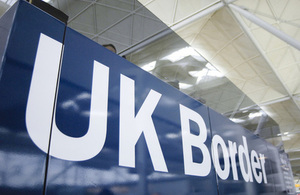Government accused of 'talking up tough headlines' in response to small boat Channel crossings
The Times newspaper reported today that the Government's expected Nationality and Borders Bill will be published next week and it will introduce new laws to allow asylum seekers to be sent abroad for offshore processing.
 Image credit: UK GovernmentThe plan is reportedly in response to concerns over the impact of asylum seekers and refugees crossing the English Channel by small boat.
Image credit: UK GovernmentThe plan is reportedly in response to concerns over the impact of asylum seekers and refugees crossing the English Channel by small boat.
A Government source working on the plans was quoted by The Times as saying: "The Prime Minister and Home Secretary are determined to look at anything that will make a difference on Channel crossings.
"The numbers have a psychological and political impact that goes far beyond the actual numbers involved. The idea that people are coming in apparently at will —even if it's a relatively small proportion of immigration to the UK — doesn't exactly give the impression we're in control, especially when people are washing up in dinghies. The only way to really tackle this problem is to tackle the pull factors, which is what the ideas around offshore processing and the presumption that if you cross illegally then your asylum applications are going to be treated less favourably than legal routes are about."
According to The Times, the proposals have been discussed with Denmark and the Home Secretary will hold further talks with the Danish government over sharing a processing centre located in Africa. The Guardian reported, however, that Home Office sources sought to play down the reports of a collaboration with Denmark. One source told the Guardian: "We're not opening talks with Denmark over the sharing of a centre."
As reported by BBC News earlier this month, Denmark recently passed legislation allowing it to relocate asylum seekers to third countries outside the EU while their claims are heard. The Danish Refugee Council said in a statement that the idea was irresponsible and lacking in solidarity.
BBC News noted that as Denmark had recently signed a memorandum of understanding (MoU) on migration with Rwanda, there was speculation that it intends to open a facility for processing asylum claims in the African country.
News that the UK was now planning a similar law was met with concern and scepticism on social media.
A number of sources, including the European Council on Refugees and Exiles (ECRE), drew attention to the fact that the MoU signed between Denmark and Rwanda does not include processing asylum applications.
Rwanda's Ministry of Foreign Affairs and International Cooperation said in a recent statement: "The Government of Rwanda received the Danish Minister for Development Cooperation and the Minister for Immigration and Integration in Rwanda from 26 to 28 April 2021 … The MoU on Cooperation regarding Asylum and Migration Issues aims to strengthen bilateral dialogue on new and sustainable solutions to current migration and refugee challenges. Denmark already provides support to the Emergency Transit Mechanism in Gashora. Receiving asylum seekers from Denmark in Rwanda and processing asylum applications to Denmark is not part of this MoU."
In a thread on Twitter, Sunder Katwala, director of British Future, said the Government was "talking up tough headlines" because it has been unable to make progress on bilateral agreements with any EU country for returning asylum seekers after Brexit.
Kaatwala said a more accurate headline for The Times' article may be 'Government plans more headlines on tough asylum rhetoric'.
Paul James Cardwell, Professor of Law at the University of Strathclyde, said on Twitter: "[These] ideas are floated fairly regularly (by the UK and the EU) and usually result in rebuttal by any country mentioned as a potential 'host'. Idea quietly dropped and then resurfaces when there is a perceived need to get 'tough' on an invisible minority."
Garden Court Chamber's Colin Yeo commented: "What strikes me about [The Times] article is that the sources seem to be downplaying the likelihood of the offshore idea from the start. It's about sending a signal."
The Joint Council for the Welfare of Immigrants (JCWI) called the plans "inhumane and farcical" and said offshore detention centres should have absolutely no place in the UK asylum system.
Labour's Nick Thomas-Symonds, the Shadow Home Secretary, called the plans "unconscionable".
The Refugee Council chief executive, Enver Solomon, said the offshoring of asylum claims would be an act of cruel and brutal hostility towards vulnerable people who through no fault of their own have had to flee war, oppression and terror.
The United Nations High Commissioner for Refugees (UNHCR) said on Twitter that it was not aware of the reported UK discussions on processing asylum claims offshore. It added that global cooperation is needed and the UK should look for solutions through cooperation instead of shifting responsibility to less wealthy countries.
Following the introduction of Denmark's law, UNHCR said in a 3 June statement: "UNHCR strongly opposes efforts that seek to externalize or outsource asylum and international protection obligations to other countries. Such efforts to evade responsibility run counter to the letter and spirit of the 1951 Refugee Convention, as well as the Global Compact on Refugees where countries agreed to share more equitably the responsibility for refugee protection.
"Already today nearly 90% percent of the world's refugees live in developing or the least developed countries that – despite their limited resources – step up and meet their international legal obligations and responsibilities."